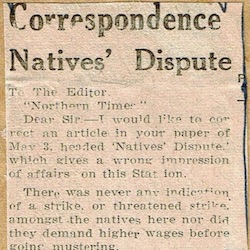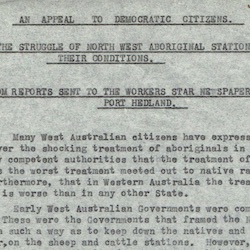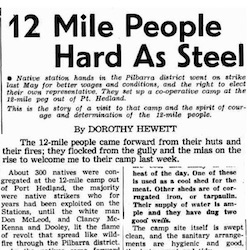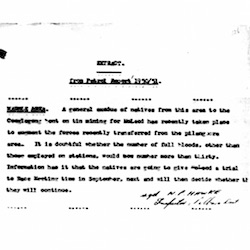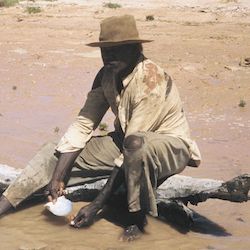Efforts to Prevent McLeod Employing Aboriginal Workers
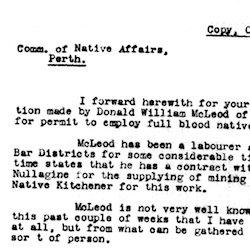
Don McLeod begins working on Bonney Downs Station, applies for a permit to employ Kitchener. Strike discussions begin.
Aboriginal People Explore Options for Improving Their Lives
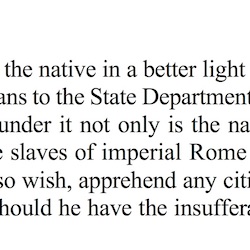
In discussions with McLeod and among themselves, marrngu explore options for improving their lives. McLeod outlines these plans to A.P. Elkin.
Constable Fletcher's Report on Race-Time Meetings
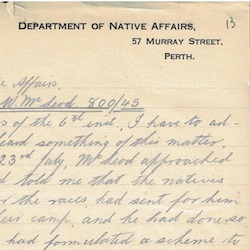
Ideas discussed included a scheme to obtain land of their own and set up economic enterprises so they would no longer be dependent on station employment. In 1945 marrngu from across the region held meetings to discuss these ideas when they converged on Port Hedland for the annual horse races. Constable Les Fletcher of the Port Hedland police was invited to attend. This is his report of the meeting.
Race-time meetings in Port Hedland.
Francis Bray Discusses Prosecuting Don McLeod
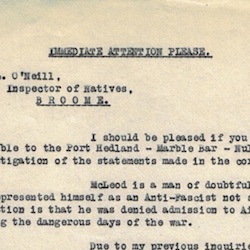
DNA attempts to stop McLeod associating with marrngu.
WWII ends.
Native Affairs Inspector O’Neill Discusses McLeod’s Activities with Bray
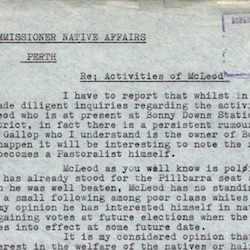
Marrngu organisers, Clancy McKenna, Kitchener, Roy McKay, Ron Captain and Dougall Cornish, moving around stations talking about the strike.
Dooley Binbin
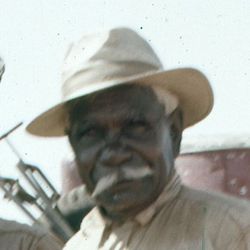
Dooley Binbin begins working with McLeod and Kitchener.
McLeod vs Richards Evidence
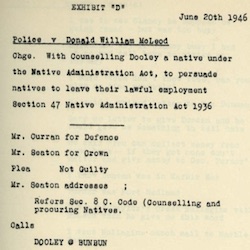
Dooley and McKenna make final arrangements for a strike on 1 May.
Urges New Deal for Aborigines
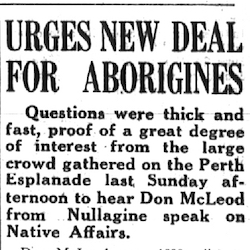
McLeod visits Perth to garner support.
Workers on De Grey station strike for higher wages. Awarded 5/- increase for the duration of the shearing.
Strike of Native Workers Will Open May First
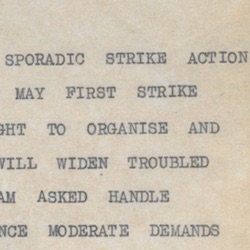
McLeod alerts the government to the impending strike. Some early strikers granted temporary wage rises.
Constable Marshall Suppresses the Strike at Warrawagine
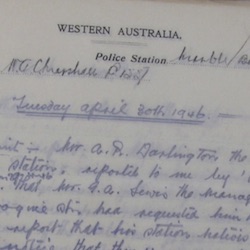
Aboriginal people in the Port Hedland and Marble Bar region strike. Constable Gordon Marshall pressures most in the Marble Bar District to return to work.
Clancy McKenna Meets Secretly with McLeod about Strike
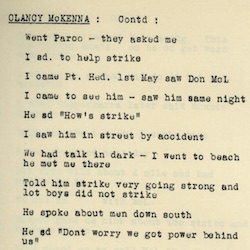
Seven domestic workers evicted from Marble Bar for striking. McKenna and McLeod meet secretly in Port Hedland.
Native Administration Act, Section 47
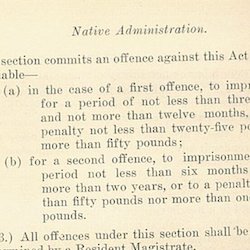
McKenna arrested and charged under section 47 Native Administration Act 1936.
Native Affairs Inspector O'Neill's Statement for McLeod Trial
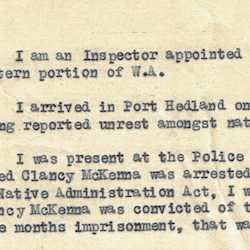
Native Affairs Inspector Laurie O’Neill and Constable Les Fletcher begin travelling through district warning workers to stay at their jobs.
Police Reports on Dooley Binbin's Arrest
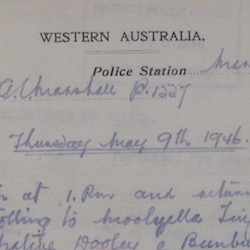
Dooley arrested by Marshall at Moolyella.
Urgent Telegram Relaying Strike Leaders' Arrests
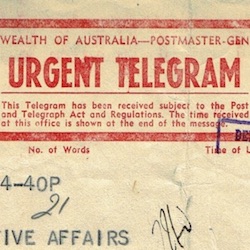
Dooley convicted for ‘enticing’ workers from employment, and McLeod arrested.
200 Citizens Call for Strike Leaders' Release
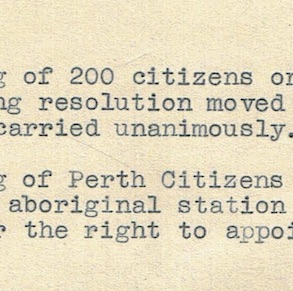
200 people on the Perth Esplanade call for the release of Clancy, Dooley and McLeod.
‘An Appeal to Democratic Citizens’ printed and distributed in Perth.
Formation of Committee for Defence of Native Rights
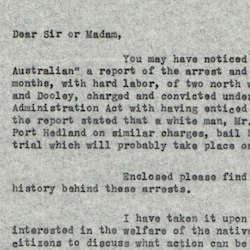
Provisional Committee for Defence of Native Rights formed at meeting convened by Alec Jolly.
Wages Dispute, Contractor Before Court
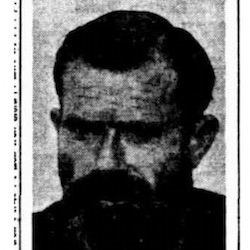
McLeod remanded on bail until 21 June.
Communist Flyer Urges Public Meeting
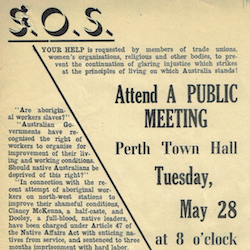
Despite the organisation’s broad base, the involvement of prominent communists, such as author Katharine Susannah Prichard, who wrote this flyer, resulted in it being labelled a communist front organisation by its critics.
Protest meeting held in the Perth Town Hall. Committee for Defence of Native Rights (CDNR) formed.
CDNR Brings International Attention to Strikers' Cause
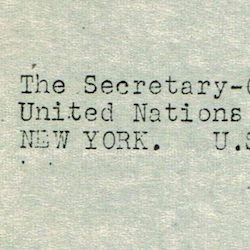
The CDNR assisted the strikers by drawing national and international attention to their cause.
CDNR appeals to the United Nations for the right of Aboriginal workers to strike.
Why Dooley and Clancy McKenna are in Gaol!
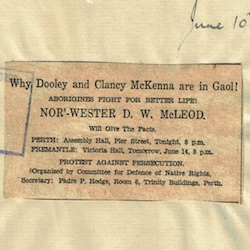
Viewing the strike as a disturbance orchestrated by McLeod, pastoralists hoped he would receive a long jail sentence. They were disappointed when he only received a heavy fine. Following his trial, public pressure led to the early release of Clancy McKenna and Dooley Bin Bin.
McLeod addresses meetings in Perth and Fremantle.
Natives' Strike: Counselling Charges, McLeod Fined £50
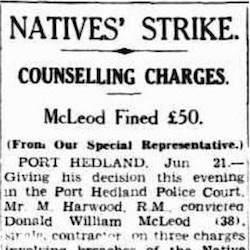
McLeod’s trial in Port Hedland.
Natives Freed
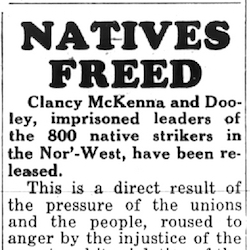
McKenna and Dooley released before serving their full sentences.
Marrngu defy a police order to camp out of town during Port Hedland horse-race carnival. Refuse to return to workplaces.
Don McLeod Arrested Again, Natives Solid
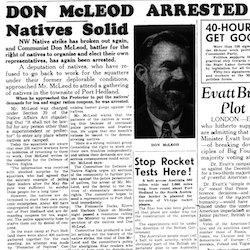
Before setting up strike camps, the strikers staged a number of non-violent demonstrations in Port Hedland in a show of strength.
Marrngu demonstrate over ration coupons. McLeod arrested but released on good behaviour bond. Strikers march into Port Hedland in protest.
Strikers Set Up Camp at Twelve Mile
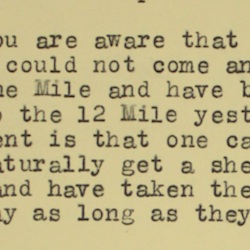
Strikers set up camp at the Twelve Mile and Moolyella.
Hedland Court Has Strange Procedure
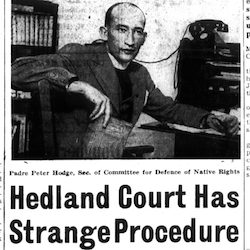
The arrest of CDNR secretary Rev. Peter Hodge, when he visited strikers at the Twelve Mile in August 1946, drew public attention to the oppressive nature of Western Australia’s Aboriginal legislation. His conviction was overturned on appeal to the High Court of Australia, which led to the overturning of a three-month jail sentence imposed on McLeod for the same offence.
Hodge flies to Port Hedland and is arrested, along with McLeod.
North-West Natives: Conditions on Stations
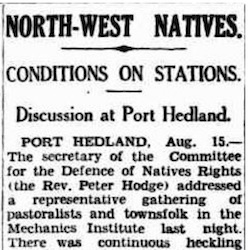
Hodge fined, addresses public meeting in Port Hedland.
Native Affairs: McLeod's Convictions, Leave to Appeal Granted
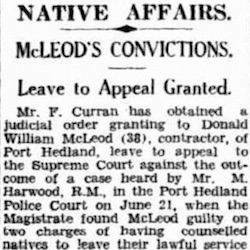
McKenna, Dooley and McLeod granted leave to appeal convictions.
CDNR Lobbies the WA Department of Education
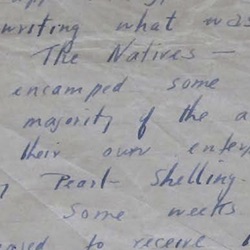
CDNR appeals to Western Australian Department of Education for assistance for the Twelve Mile School.
Natives' Strike: Further Litigation
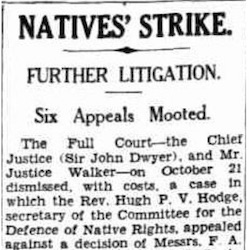
Appeal against Hodge’s conviction dismissed by the full court of the Western Australian Supreme Court.
Natives' Strike: Conviction Appeals, Why They Failed
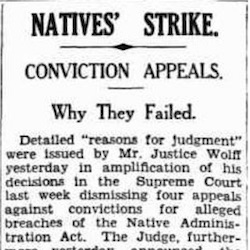
Appeals by McLeod, McKenna and Dooley against their convictions fail in the Western Australian Supreme Court.
Dorothy Hewett and Lloyd Davies visit the strikers.
Negotiations of Reemployment with Improved Conditions
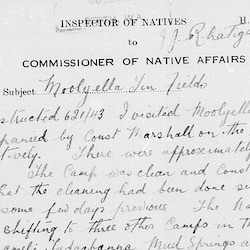
Gordon Mackay leads a break-away group from the Moolyella strike camp to negotiate reemployment with improved wage and conditions.
Yarrie Jack Coppin's Statement on the Moolyella Breakaway Group
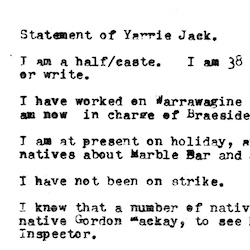
McKenna and other strikers take Mackay’s breakaway group from Marble Bar to the Twelve Mile to prevent them returning to station employment and weakening the strike.
Strikers Sentenced to Imprisonment
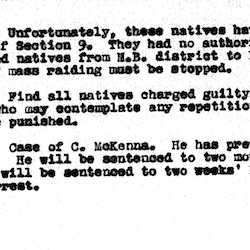
McKenna sentenced to two months imprisonment, and nine other strikers sentenced to fourteen days for taking dissident strikers to the Twelve Mile.
Native Arrests Rouse Strong Perth Protests
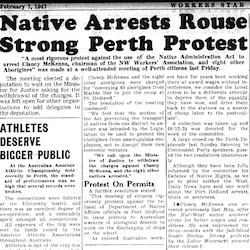
Meeting in Perth protests against the imprisonment of McKenna and other strikers.
No Iron Curtain Between White and Black Australians
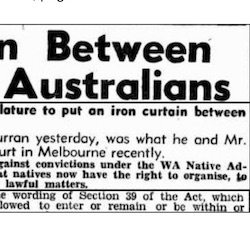
Hodge’s appeal against his conviction upheld by the High Court of Australia. McLeod’s appeal accordingly upheld by the Western Australian Supreme Court.
DNA Attempts to Negotiate with Strikers
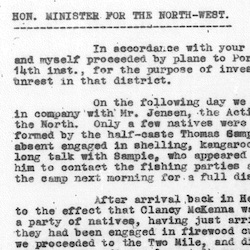
The Department of Native Affairs attempts for the first time to negotiate with strikers, but these attempts are unsuccessful.
DNA Tries to Control Strikers
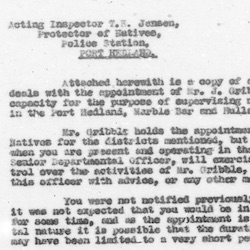
Jack Gribble appointed by the Western Australian Department of Native Affairs as special officer at the Twelve Mile to exercise a controlling influence over strikers.
Ernie Mitchell Sentenced to Imprisonment
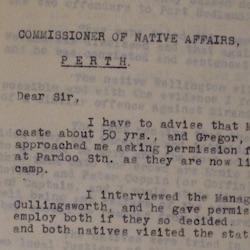
Ernie Mitchell sentenced to 7 days imprisonment for threatening to escalate the strike.
Jack Gribble’s Appointment as Inspector Terminated
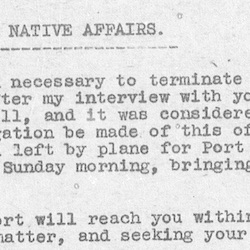
Jack Gribble’s appointment as inspector terminated.
Moolyella Becomes Main Strike Camp
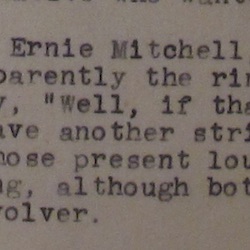
Twelve Mile strike camp declining in numbers. Moolyella becomes the main strike camp.
McLeod Discusses Obtaining Land with Government
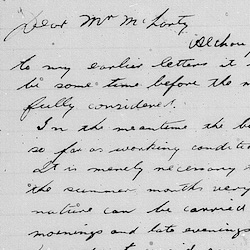
McLeod becomes more directly involved in finding new sources of income for the strikers. The idea of their obtaining land is again raised with the Western Australian government.
Catholic Mission Proposed for White Springs Station
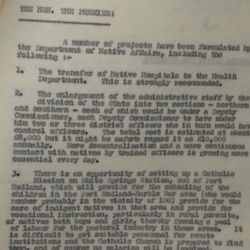
Port Hedland Catholic priest, Edward Bryan, proposes establishing a mission on the abandoned White Springs Station.
McLeod Favors School on Aboriginal Station
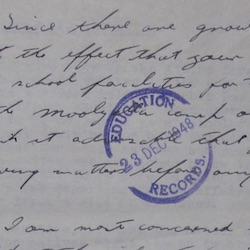
McLeod argues against Western Australian Department of Education proposal for a school at Moolyella in favour a school on an Aboriginal owned and operated station.
DNA Declares Twelve Mile Forbidden Settlement
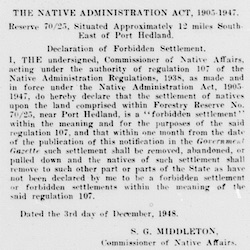
Department of Native Affairs declares the Twelve Mile a ‘forbidden settlement’ for Aboriginal people.
Officials Discuss Twelve Mile Prohibited Area for Aboriginal Camps
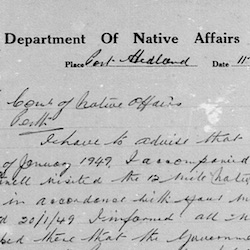
Twelve Mile strikers are given one month to dismantle their buildings and leave. This order retracted under threat of further strike action.
Strikers Promise to Fill the Jails in Protest
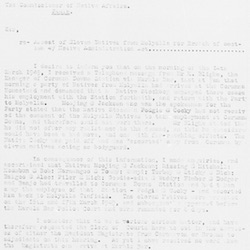
Thirteen men given 2- and 3-month jail sentences for entering Corunna Downs to remove workers. Strikers promise to fill the jails in protest.
Men Arrested and Transported in Chains
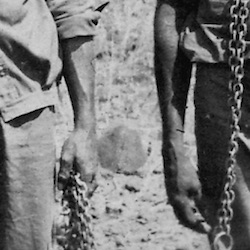
Thirty-three men arrested and transported in chains for removing workers from Warrawagine Station.
McLeod Urges Seamen's Union to Ban Wool
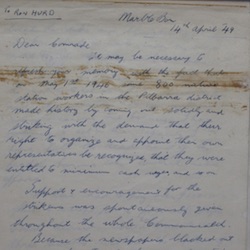
Fremantle Branch of the Seamen’s Union threatens to ban wool shipments from the Pilbara if men are not released.
DNA Under Threat of Wool Ban
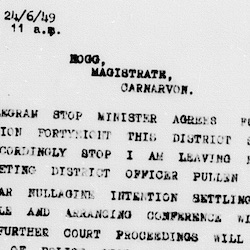
Under threat of a wool ban, Department of Native Affairs undertakes to prevent further convictions when ten more strikers arrested.
Native Affairs Officer Sydney Elliott-Smith
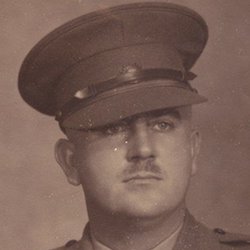
Native Affairs Officer Sydney Elliott-Smith reaches an agreement with the strikers, granting concessions in return for an undertaking to cease protest action.
Seamen's Solidarity Wool Ban Wins Victory for Aboriginal Workers
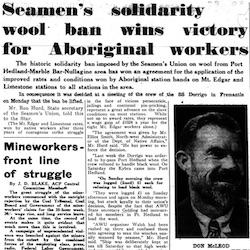
Seamen on the S.S. Kybra refuse to load wool in Port Hedland. Ban is lifted when Elliott-Smith agrees to a wage scale.
Employment of Natives
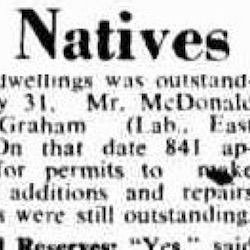
Western Australian government backs away from Elliott-Smith’s concessions.
Aboriginal People Debate Continuance of Strike
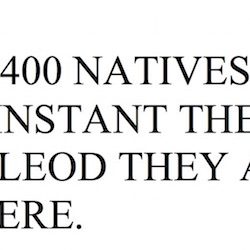
Marrngu debate whether to adhere to their agreement with Elliott-Smith or to continue the strike.
Aboriginal People Return to Employment and Others Prospect
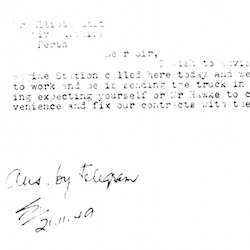
Some marrngu return to employment while others begin prospecting.
Notice of Mining Application
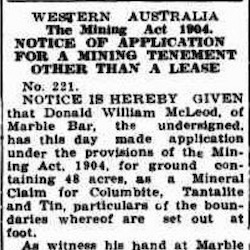
McLeod applies for columbite, tantelite and tin claims at Pilgangoora.
Aboriginal People Establish School in Marble Bar
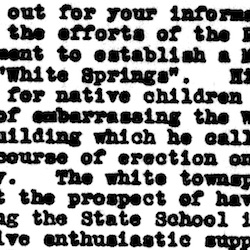
Marrngu collect funds to establish a hostel in Marble Bar so their children can attend school.
Labour Situation in Pilbara Returns to Normal
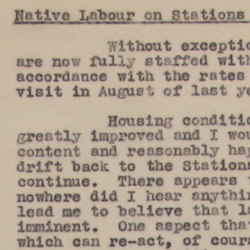
Labour situation on Pilbara stations has largely returned to normal.
Marrngu who have not taken employment decide to join the mining operation on a trial basis and begin mining in the Cooglegong mining area.
Two Aboriginals Arrested in a Dawn Raid
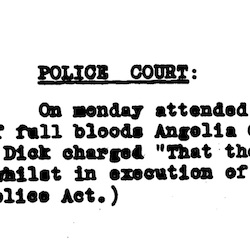
Two marrngu arrested for trying to stop police killing their dogs in a dawn raid.
Cooperative Members Work Minerals
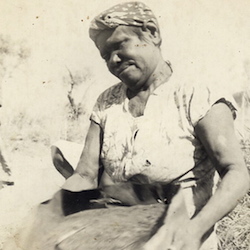
Marrngu begin working significant wolfram deposit at Cooke’s Creek. Arrangements made with South Australian interests to form a syndicate.
Six More Four Mile Miners Arrested
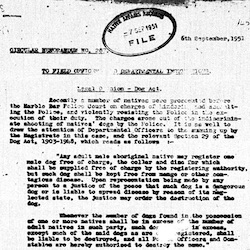
Six more Four Mile miners sentenced for intervening in police dawn dog cull. The practice is stopped as a result.
White Man Helps Natives Win Mineral Wealth
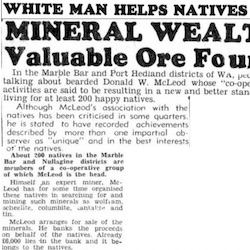
The cooperative is making large profits from mining.
Western Wolfram Formed to Work with Aboriginals
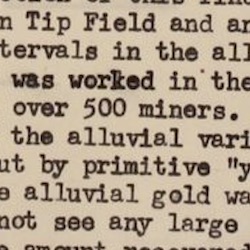
Western Wolfram formed in Adelaide to work wolfram with the Aboriginal mining group.
Native-Labour Drift Worries Pastoralists
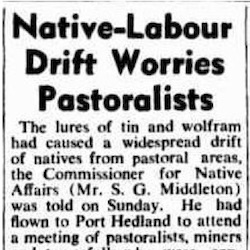
A cooperative mining company, Northern Development and Mining (or NODOM) was established at the end of 1951. The success of the mining venture led the government to withdraw its opposition to the movement. By 1952, upward of 700 people were involved in the independent mining community, and the local pastoral industry was facing even greater labour shortage than during the strike. As a result, a Committee of Inquiry was appointed by the government to investigate the circumstances in which marrngu were leaving the stations.
Many marrngu leave station and other employment to join the mining cooperative. DNA withdraws its opposition to the movement.
Hunting for Souls in the Nor'-West
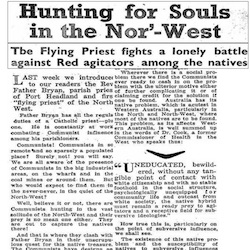
School commences at White Springs Mission, developed as a counter to the cooperative movement.
Report on Roy Hill Station Before the Exodus
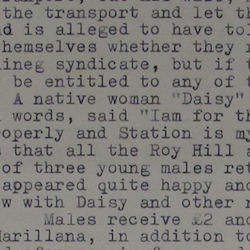
Large meetings held in Marble Bar to invite more marrngu to join the cooperative. Daisy Bindi attends but returns to Roy Hill.
Cooperative Group Purchases Yandeyarra Station
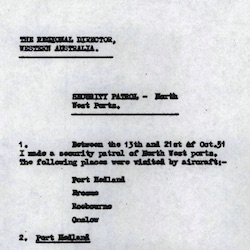
Yandeyarra station purchased by the group, now numbering 500. Their success worries Australia’s security services.
Northern Development and Mining Established
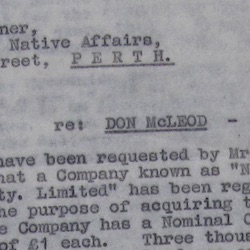
Northern Development and Mining established, a development applauded by the Department of Native Affairs.
Officials Consider NODOM Greatest Advance in Native History
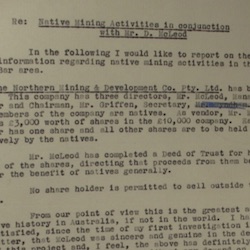
The Western Australian Deputy Commissioner of Native Affairs calls the establishment of NODOM ‘the greatest advance in native history in Australia’.
Mining Cooperative is Set Up Under Daisy Bindi's Leadership
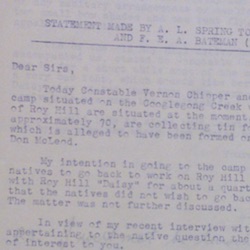
Daisy Bindi and other marrngu leave Roy Hill and surrounding stations and set up their own mining cooperative under Daisy’s leadership.
Committee of Inquiry and WA Department of Mines
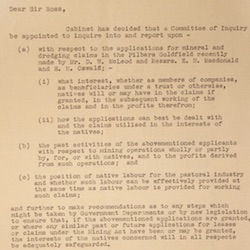
Committee of Inquiry into the movement established by the Western Australian Department of Mines.
Peter Hodge Informs Council of Cooperative Movement
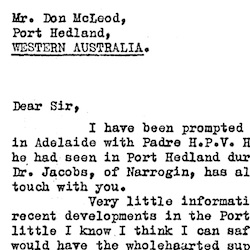
The Council for Aboriginal Rights makes contact with McLeod.
Commissioner Middleton Supports School at Yandeyarra
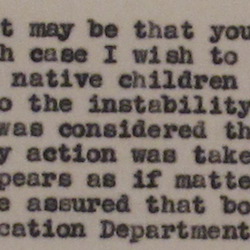
Commissioner of Native Affairs Middleton strongly supports the group’s application to the WA Department of Education for a school at Yandeyarra.
Mines Labour Inquiry to Shift to N.W.
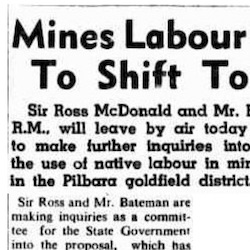
From March to May Sir Ross McDonald and Magistrate F.E.A. Bateman conduct inquiry into the movement.
School Decision Delayed
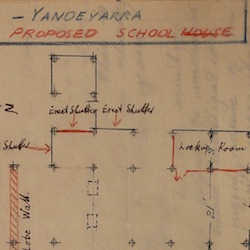
Headmaster of Marble Bar school recommends a school at Yandeyarra, but decision delayed awaiting outcome of McDonald-Bateman enquiry.
White Springs Mission Closes
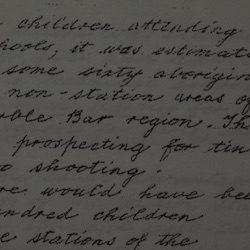
White Springs Mission closes.
Report of Cooperative Movement's Impact on Pastoral Labour
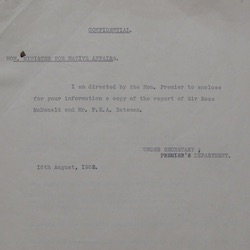
McDonald-Bateman report tabled.
McLeod Writes to Ross McDonald on Mining Ventures
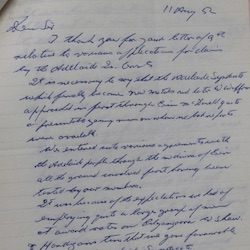
NODOM’s business arrangements with Western Wolfram break down.
Dessie and Donald Stuart Join the Cooperative
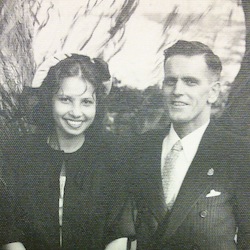
Dessie and Donald Stuart join the group. Donald has been visiting throughout 1952.
A Mining Company Gets £3,400
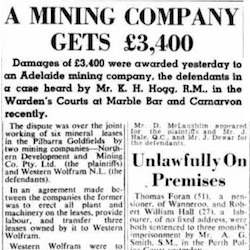
Litigation against Western Wolfram sees NODOM lose its valuable wolfram deposits.
NODOM Shifts Focus from Wolfram to Tanto-Columbite
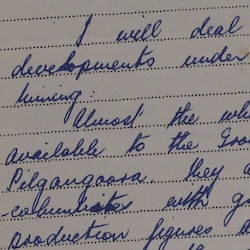
As a result of the loss of their wolfram deposits, NODOM shift focus from wolfram in the Blue Bar-Cooke’s Creek area to mining tanto-columbite in the Pilgangoora mining area.
Gathering Facts About Aboriginal People
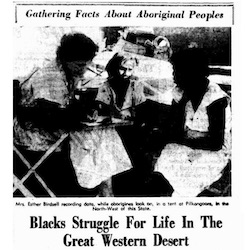
Esther and Joseph Birdsell, Dorothy and Norman Tindale, and Phillip Jud Epling, of the University of Adelaide and University of California Anthropological Expedition 1952-54, arrive in Marble Bar and spend three months in the cooperative camps.
Molly Williams, Walking from Blue Bar to the Bore
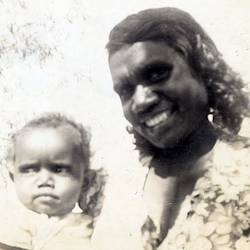
With cyclonic rains making roads impassable to vehicles, many marrngu shifted from the Blue Bar area on foot through heavy rains.
DNA Supports Application For School
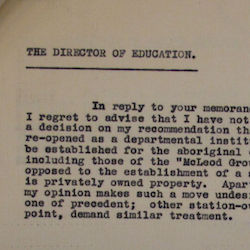
Middleton withdraws his support for the establishment of a Department of Education school at Yandeyarra.
A Continuing and Adapting Aboriginal Culture
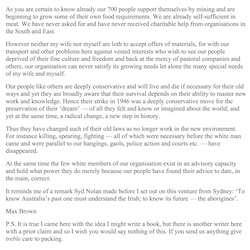
Kathleen and Max Brown join the group. Kathleen begins teaching a school in the Yandeyarra shearing shed.
School Children of the Cooperative
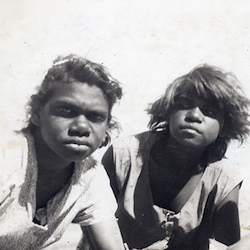
Bill Rourke, District Superintendent of North-West Schools, visits Yandeyarra and strongly recommends a school there, in the light of which Middleton withdraws his opposition.
Columbite Ore Contaminated
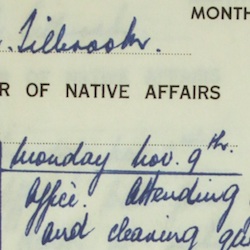
Columbite ore produced by the cooperative found to be contaminated with iron and practically worthless.
McLeod Discusses Conditions and Future of NODOM
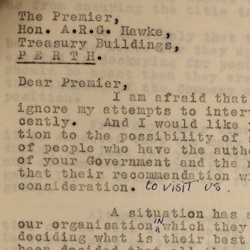
As the group’s economic situation deteriorates, McLeod attempts to organise meetings between government representatives and the group.
Non-Aboriginal Participants Leave Cooperative
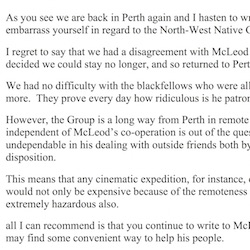
Non-Aboriginal participants Max and Kathy Brown, Donald Stuart and Victor Proudfoot leave. Des Stuart remains.
Commissioner Middleton Opposes School at Yandeyarra
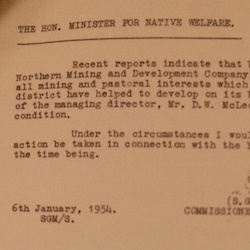
Commissioner Middleton again opposes the establishment of a school at Yandeyarra, probably in response to negative reports from Donald Stuart.
Cooperative Group Hopes to Petition Queen Elizabeth
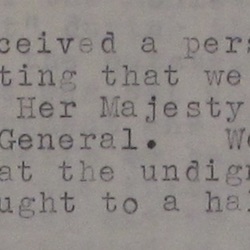
The group attempts to present a submission to Queen Elizabeth during her visit to Australia.
The Cooperative Enters Hard Times
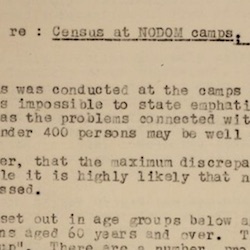
The cooperative enters hard times. 364 people remain.
Government Officials Stop Correspondence with McLeod
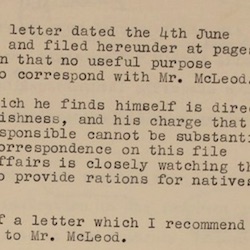
Government representatives cease corresponding with McLeod.
Conditions of NODOM Camps
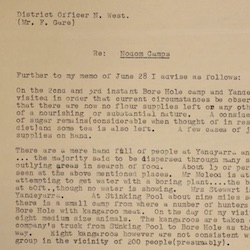
With stores severely depleted, NODOM members spread out in small camps living off the land.
NODOM Goes Into Liquidation
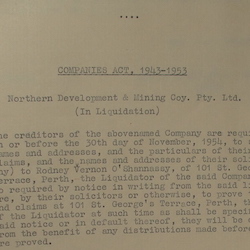
NODOM goes into voluntary liquidation. McLeod moves down to Perth at about this time.
Department of Native Welfare Begins Rationing
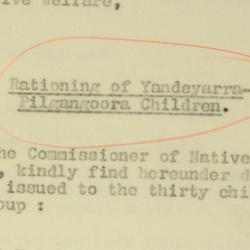
Department of Native Welfare begins fortnightly rationing of children of the group.
Ernie Mitchell Appeals to Department For Urgent Assistance
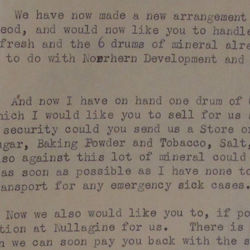
Mitchell appeals to Middleton for assistance, and asks that Riverdale, one of NODOM’s stations, be kept for the group as the base for a school.
Des Stuart
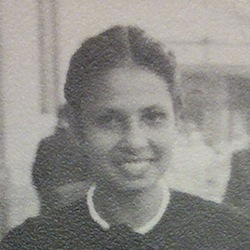
Des Stuart leaves the group for Darwin and later London, suffering tuberculosis.
McLeod Hopes to Organise Aboriginal People in South
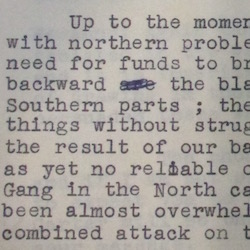
McLeod, in Perth, hopes to organise Aboriginal people in the southern part of the state.
Report of Cooperative Movement Group
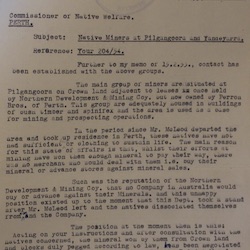
The Department of Native Welfare arranges for the sale of mineral won by the group, now mostly living at Pilgangoora.
Statement on Donald William McLeod, Formerly of Pilbara District
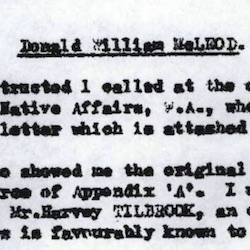
Middleton contacts ASIO about McLeod’s activities and provides a statement.
Pilbara Native Society is Established
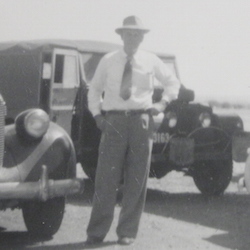
Middleton visits Pilbara and establishes the Pilbara Native Society.
McLeod Establishes Pindan
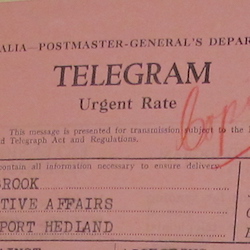
McLeod returns to the Pilbara to establish Pindan. Middleton unsuccessfully tries to prevent this at a meeting at the Bore.
'King' of the Blacks Comes to Town
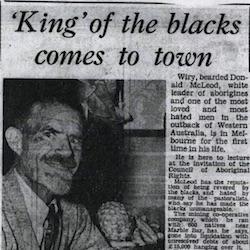
McLeod conducts a lecture tour of Melbourne, Sydney and Adelaide.
Department of Native Welfare Acquires Yandeyarra as Native Reserve
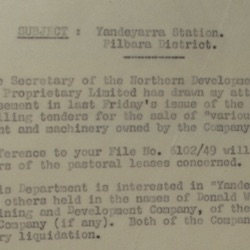
Liquidators call for tenders for NODOM equipment and properties. Department of Native Welfare decides to acquire Yandeyarra as a native reserve.
Department Establishes Hostel at Riverdale Station
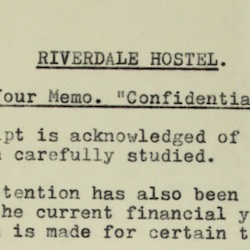
Department begins establishing a hostel at Riverdale Station near Nullagine, previously owned by NODOM.
Department Stops Rationing Children of the Group
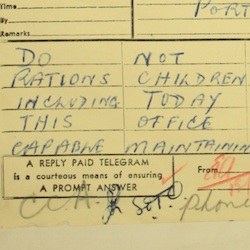
Department stops rationing children of the group, having done so for a year.
Cooperative shifts from Pilgangoora to camps along the coast and start working on grass seed and pearl shell collection.
Donald Stuart Beings Work as Native Welfare Officer
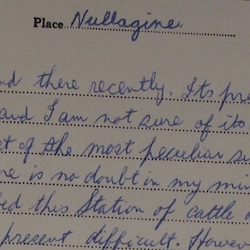
Donald Stuart begins working as a Native Welfare Officer at Riverdale, with the job of undermining McLeod.
Clements Sends McLeod Recordings to Street
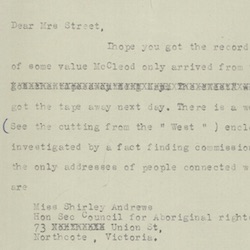
Sound recordings of McLeod are sent to Jessie Street in London.
Middleton Opposes Pindan and Undermines McLeod
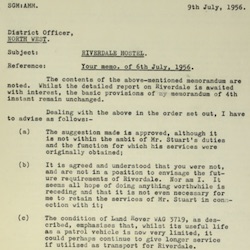
The Riverdale hostel project is abandoned as ‘an abject failure’. Stuart leaves.
Department Tries to Amend Native Welfare Act
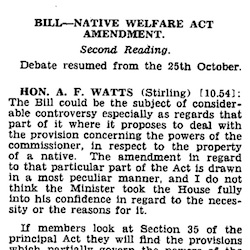
Department attempts unsuccessfully to amend the Native Welfare Act to give Commissioner greater control over the assets of Aboriginal people.
Harold Blair to Speak at Town Hall
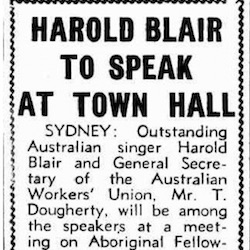
McLeod attends Aboriginal-Australian Fellowship meeting in Sydney and has other speaking engagements.
Paddy Yabala, Just an Ordinary Fence
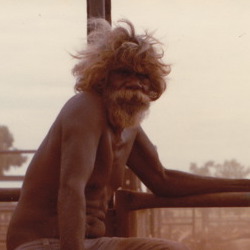
Pindan challenges Western Australia’s ‘leper line’ legislation by travelling back and forth across the twentieth parallel and bringing new members into the cooperative from northern stations.
Meeting in Perth Town Hall
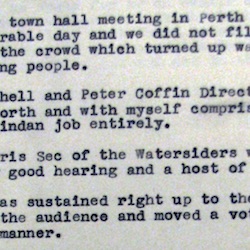
McLeod, Mitchell and Peter Coppin address meeting in Perth Town Hall.
A Visit to Pindan Camps
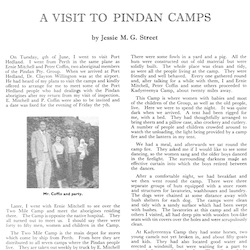
Mitchell and Coppin return to Port Hedland with Jessie Street. Street spends four days visiting the cooperative camps.
Pindan Members Arrested North of the Leper Line
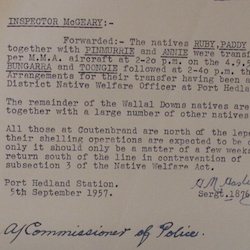
People who joined Pindan from stations north of the leper line are arrested and forcibly sent to Broome.
Dooley Convicted of Leper Line Offences
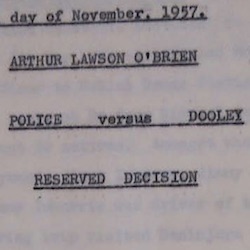
Dooley found guilty of leper line offences, fined £1 with £32.7.0 costs. Conviction is unsuccessfully appealed in Western Australian Supreme Court in December.
Middleton Calls for Repeal of Leper Line Legislation
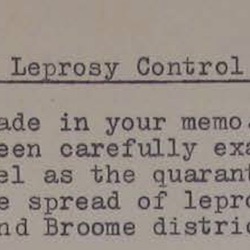
As a result of Pindan’s civil disobedience action, Middleton recommends that leper line legislation be repealed or amended.
Pindan Prospects for Manganese
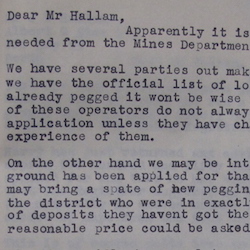
Pindan begins prospecting for manganese.
Pindan People Fishing with New Boats
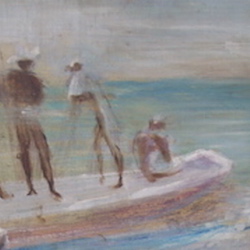
Artist James Vandeleur (Jim) Wigley joins the group, initially helping to construct boats for pearl shelling operations.
Pindan Works with Albert G. Sims Ltd.
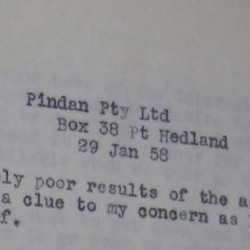
Pindan finds manganese deposit at Nimingarra and begins preparing to work it as a joint enterprise with Albert G. Sims Ltd.
Simdan Establishes Nimingarra Manganese Mine
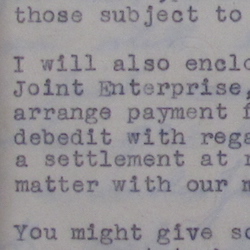
Syndicate company, Simdan, works to establish Nimingarra manganese mine.
McLeod Launching a Happy Capitalist
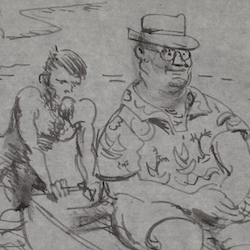
In Perth, Jessie Street holds meetings with McLeod, the lawyer T.J. Hughes and Sims representative Jim Hallam, attempting to resolve disputes.
Authority and Leadership in a New-Style Australian Aboriginal Community
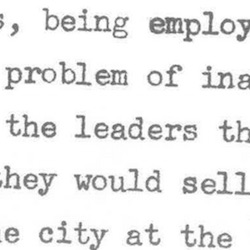
While McLeod is in Perth, rank and file Pindan members protest that they are receiving too little reward for their labour.
Ernie Mitchell Addresses a Meeting
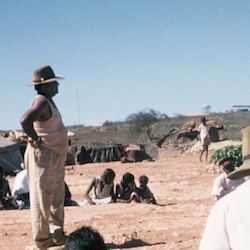
Dissatisfaction continues over issues including the lack of schooling. McLeod, removed as leader, is to work on projects with a team of young men.
McLeod Resigns as Pindan Director
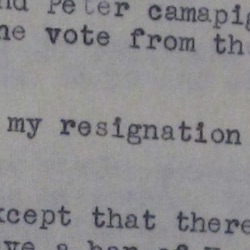
In opposition to a community decision to retain lawyer Hughes, McLeod resigns as director of Pindan.
Nomads Group Forms and Grows
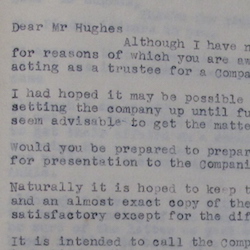
Splinter group, called Nomads, forms and grows in size throughout 1959.
Simdan's Manganese Mining Equipment
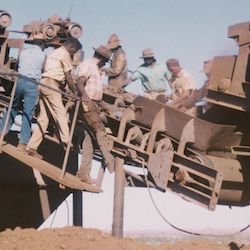
Pindan continues working with A.G. Sims on the Nimingarra manganese mine.
Nomads Pty Ltd Incorporated
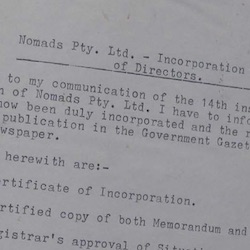
Nomads Pty Ltd incorporated. Nomads move to Roebourne area during 1960.
Pindan Natives Advance Nearer Goal
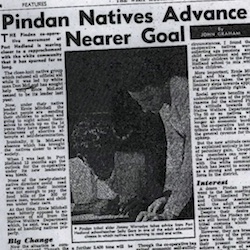
Pindan establishes bridging school in Port Hedland and children begin attending local school.


